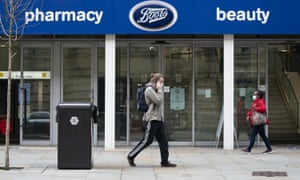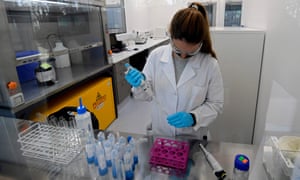
The Covid-19 vaccine being developed by the University of Oxford produces a similar immune response in both older and younger adults, and adverse responses were lower among the elderly, British drugmaker AstraZeneca Plc said on Monday.
A vaccine that works is seen as a game-changer in the battle against the novel coronavirus, which has killed more than 1.15 million people, hammered the global economy and shuttered normal life across the world.
“It is encouraging to see immunogenicity responses were similar between older and younger adults and that reactogenicity was lower in older adults, where the Covid-19 disease severity is higher,” an AstraZeneca spokesman told Reuters.
“The results further build the body of evidence for the safety and immunogenicity of AZD1222,” the spokesman said, referring to the technical name of the vaccine.
The news that older people get an immune response from the vaccine is positive because the immune system weakens with age and older people are those most at risk of dying from the virus.
The Financial Times reported earlier that the vaccine, being developed by Oxford and AstraZeneca, triggers protective antibodies and T-cells in older age groups – among those most at risk from the virus.
The Oxford/AstraZeneca vaccine is expected to be one of the first from big pharma to secure regulatory approval, along with Pfizer and BioNTech’s candidate.
If it works, a vaccine would allow the world to return to some measure of normality after the tumult of the pandemic.
Immunogenicity blood tests carried out on a subset of older participants echo data released in July which showed the vaccine generated “robust immune responses” in a group of healthy adults aged between 18 and 55, the Financial Times reported.
Thousands of free meals will be provided to children in England by businesses, local authorities and community groups on the first day of half-term as the government faces a damaging revolt on the issue.
Dozens of people from a range of organisations have stepped in to help, with health secretary Matt Hancock hailing them as “absolutely wonderful” while insisting that millions has already been provided to councils to help their communities.
A petition from the Manchester United footballer Marcus Rashford, who has been spearheading demands for free meals to be extended in England over the school holidays, has passed 800,000 signatures, piling further pressure on the government to act.
Hancock said he agrees “very strongly” with “the purpose” of Rashford’s campaign, telling Sky News: “I think we’re all inspired by the way that he’s led that campaign. And the purpose is that no child should go hungry, and that’s right.”
He said Universal Credit had been increased by £20 a week while £63m has already been provided by central government to local authorities so that they can support people.
Updated
at 4.54am EDT
Wales’ health minister has said that supermarkets in the country can sell non-essential items during the firebreak lockdown in “exceptional circumstances”.
The Welsh government is due to discuss the ban, which has been heavily criticised over the weekend, with supermarkets on Monday.
“We’re looking to have that clarity so you don’t see cards, for example, sealed up in one shop but available in another,” Vaughan Gething told Sky News.
“We want the clarity on the principle that if there really are exceptional circumstances when someone needs what would otherwise be a non-essential item, that can happen as well.
“We want that clarity because this potentially overshadows the much bigger issue of having a firebreak to save people’s lives.”
Updated
at 4.54am EDT
UK health secretary says tier 4 restrictions can’t be ruled out
The UK’s health secretary, Matt Hancock, said the government would “rule nothing out” on the prospect of a new fourth tier of measures, a fortnight after it brought in a three-tiered coronavirus restrictions system.
He told BBC Breakfast: “We’ve always said all along that we take nothing off the table. Having said that, we have seen the rise in the number of cases has slowed a bit.
“The problem is it’s still going up, and while it’s still going up we’ve got to act to get it under control. We rule nothing out but at the moment the three-tier system is what we’re working to and it’s effective in slowing the growth of this virus but it hasn’t brought this curve to a halt.”
Updated
at 4.06am EDT
Russia’s daily tally of new coronavirus cases surged to a record high of 17,347 on Monday, including 5,224 in Moscow, taking the national tally to 1,531,224.
Authorities said 219 people had died in the last 24 hours, pushing the official death toll to 26,269.
The UK pharmacy chain Boots is set to unveil a new asymptomatic coronavirus testing service it says can return results from swab tests in just 12 minutes.
Boots said the LumiraDx devices, which are able to quickly process swab tests to give customers same-day results, will be rolled out in selected stores over the next few weeks.
It has also launched a 48-hour testing service which is available in 10 stores across London, Birmingham, Manchester, Edinburgh and Glasgow, with plans to extend the programme to more than 50 outlets across the nation.
The service is available as a private pre-flight test for customers who require one before travelling abroad, or as a solution for those who would prefer peace of mind before seeing friends and family. The in-store service will cost £120 per test.

Customers who are not displaying symptoms will be able to book an in-store coronavirus test at Boots. Photograph: Xinhua/Rex/Shutterstock
Seb James, managing director of Boots UK and ROI, said the programme was being implemented as a way to help ease the pressure on the nation’s health services.
“Boots has supported the government’s Covid-19 testing programme from the very start and offering this new in-store service is the next step in our efforts to fight against the pandemic,” he said.
“We hope that by offering this testing option in local community stores, Boots can help ease pressure on the NHS and the government by providing additional access to testing and crucial reassurances for people across the UK.
Customers who are not displaying any Covid-19 symptoms can book an in-store test through the company’s website.
Updated
at 4.06am EDT
France may be experiencing 100,000 new Covid cases a day
France may be experiencing 100,000 new coronavirus cases per day – two times more than the latest figures – Prof Jean-François Delfraissy, who heads the scientific council that advises the government on the pandemic, told RTL radio on Monday.
“There is probably more than 50,000 cases per day. We estimate, on the scientific committee, that we are more in the region of 100,000 cases per day,” said Delfraissy.
France registered a record 52,010 new confirmed coronavirus infections over the past 24 hours, the health ministry said in a statement on Sunday, as a second wave of cases surges through Europe.
The new cases took the French total to 1,138,507, with France ahead of Argentina and Spain to register the world’s fifth highest number of cases after the US, India, Brazil and Russia.
Updated
at 3.29am EDT
The Covid-19 vaccine being developed by Oxford University and AstraZeneca produces a robust immune response in elderly people, the group at highest risk, the Financial Times has reported.
The vaccine triggers protective antibodies and T-cells in older age groups, the FT said said, citing two people familiar with the finding, encouraging researchers as they seek evidence that it will spare those in later life from serious illness or death from the virus.
Details of the finding are expected to be published shortly in a clinical journal, the FT said, without naming the publication.

A Covid-19 vaccine trial by Oxford University and AstraZeneca has produced encouraging results in elderly people. Photograph: Juan Mabromata/AFP/Getty Images
The findings echo data released in July that showed the vaccine generated “robust immune responses” in a group of healthy adults aged between 18 and 55, the newspaper reported, citing people aware of the results from so-called immunogenicity blood tests.
But it cautioned that positive immunogenicity tests do not guarantee that the vaccine will ultimately prove safe and effective in older people.
AstraZeneca, which is developing the vaccine with Oxford University researchers, is seen as a frontrunner in the race to produce a vaccine to protect against Covid-19.
Oxford and AstraZeneca did not immediately respond to Reuters’ request for comments.
One of the world’s leading coronavirus vaccine candidates, called AZD1222 or ChAdOx1 nCoV-19, was developed by Oxford University scientists and licensed to AstraZeneca in April, which took on the task of scaling trials and production.
Updated
at 3.30am EDT
In the UK, the main opposition Labour party has hit out at the government’s decision to allow the temporary suspension of VAT on personal protective equipment (PPE) to expire, calling the move “unbelievable”.
The Treasury cut VAT on PPE to 0% in May, with the cut applying to items such as face masks and aprons purchased by care homes, businesses, charities and individuals to protect against the virus.
It was initially due to return to 20% in August, but was extended until 31 October at the estimated cost of around £255m for the six-month period.
Labour says the Treasury has confirmed the suspension will not be extended, with shadow financial secretary to the Treasury James Murray calling the decision “the last thing” families need.
He said:
It’s unbelievable that the government wants to introduce a mask tax in the middle of a pandemic.
“With Covid cases on the rise across the country, the government should be doing all it can to help people follow its own guidance to wear a mask, not ramping up the cost of buying one.
“Families across the country are already struggling financially as a result of the crisis. The last thing they need is to be penalised for doing the right thing.”
Updated
at 3.38am EDT

Helen Sullivan
That’s it from me for today. Thanks for following along – Amy Walker will be with you for the next few hours of pandemic news.

Naaman Zhou
The news was greeted with tears, cheers and, at the afternoon school pick-up, a spontaneous concert of parents honking car horns in celebration.
In Australia, as the state of Victoria’s premier, Daniel Andrews, announced at 3.30pm on Monday that Melbourne’s months-long lockdown would (largely) come to an end, residents rejoiced.
Osman Faruqi
(@oz_f)Everyone was at home Brigid https://t.co/RG4W6pGOId
From midnight on Tuesday cafes, restaurants, bars and beauty services will reopen, subject to patron limits, and people will be able to leave their home for any reason.
It was a moment of high anticipation.
.png?width=140&height=140&quality=85&auto=format&fit=max&s=32ea9797a92d7f3aaeca5c2eadf8ffbf)
Jessica Glenza
With the US election just over a week away, millions of Americans have been heading to the polls this fall with healthcare and drug prices as their top voting issue.
The United States’ massive, largely private and very expensive health industry has ranked as a top voter concern for years, and helped drive Democrats to victory in the midterm elections of 2018, when the party took control of the House of Representatives.
While over the last six months of the coronavirus pandemic, which has killed more than 220,000 Americans, Covid-19 eclipsed healthcare as the top issue of the election, many health voters argue the two are inseparable:
Summary
Here are the key developments from the last few hours:
- China has detected 137 new asymptomatic coronavirus cases in Kashgar in the north-western region of Xinjiang, after one person was found to have the virus the previous day – the first new local cases for 10 days in mainland China.All the cases detected on Sunday were linked to a garment factory where the parents of a 17-year-old girl who was found on Saturday to have the virus – but showed no symptoms – worked, a Xinjiang health commission official told a press briefing.
- The United States saw 83,718 new cases reported nationally on Saturday, nearly matching the record 83,757 infections reported on Friday, as US Vice President Mike Pence announced that he will continue campaigning on Sunday, despite his chief of staff and four other top aides having tested positive for coronavirus.
- Spain’s prime minister, Pedro Sánchez, declared a new nationwide state of emergency on Sunday – including a curfew – in the hope of stemming a resurgence in coronavirus infections. The Socialist leader told the nation in a televised address that the extraordinary measure will go into effect on Sunday from 11pm to 6am.
- Australia’s coronavirus hot spot of Victoria on Monday reported zero cases of coronavirus for the first time since June, and the premier, Daniel Andrews, announced that restrictions would be easyed – among these are that hospitality and beauty businesses could reopen.
- Five aides to US Vice President Mike Pence tested positive. The coronavirus pandemic continues to ravage the White House itself, with the chief of staff to Mike Pence and four othersin the vice-president’s inner circle having tested positive. Despite Pence being exposed to the disease, he planned to continue an aggressive campaign schedule in the final nine days of the race. The vice-president was scheduled to hold a rally on Sunday afternoon in Kinston, North Carolina.
- India’s total coronavirus infections stood at 7.91 million on Monday, having risen by 45,148 cases in the last 24 hours, health ministry data showed. India recorded its lowest death toll in about four months on Monday with 480 deaths reported in the last 24 hours, taking total fatalities to 119,014.
- Mexican health authorities acknowledged Sunday that the country’s true death toll from the coronavirus pandemic is far higher than thought, saying there were 193,170 “excess” deaths in the year up to 26 September, with 139,153 of those judged to be attributable to Covid-19. That is about 50,000 more deaths than Mexico’s official, test-confirmed death toll of about 89,000, and about 56% higher than the previous estimate of 103,882 pandemic deaths.
- Malaysia’s king on Sunday rejected a proposal by embattled Prime Minister Muhyiddin Yassin to declare a state of emergency to fight a new outbreak of the coronavirus. The plan by Muhyiddin, which involves suspending Parliament, has sparked national outrage, with critics slamming the move as an undemocratic means for him to hang on to power amid challenges to his leadership.
- Israel will begin its first clinical trials of a novel coronavirus vaccine next month, authorities said Sunday, as the country grapples with a second wave of infections.
- The World Health Organization’s coronavirus dashboard showed a third consecutive daily record high in the number of new confirmed cases. Nearly half of Saturday’s new cases were registered in the WHO’s Europe region, which logged a one-day record high of 221,898 cases.
- The WHO chief warned against “vaccine nationalism”, calling for global solidarity in the rollout of any future coronavirus vaccine, as the number of cases soared across the world. In a video address at the opening of the three-day World Health Summit in Berlin, Tedros Adhanom Ghebreyesus urged leaders to choose to, “vaccinate some people in all countries rather than all people in some countries.”
- Australia’s coronavirus hot spot of Victoria on Monday reported zero cases of coronavirus for the first time since June,a day after the state delayed the easing of restrictions because of a fresh outbreak in Melbourne’s northern suburbs.
- France registered 52,010 new confirmed coronavirus cases in the past 24 hours, following a record 45,422 on Saturday, the health ministry said in a statement on Sunday. It also said that 116 people had died from coronavirus infection over the past 24 hours, compared to from 137 on Saturday, taking the total confirmed death toll to 34,761.
- An official from China’s Xinjiang health commission said that 137 new asymptomatic cases have been detected in the region. All of the new cases were linked to a garment factory.
- The prime minister of Italy Giuseppe Conte announced a raft of new restrictions and warned that the country’s escalating coronavirus infection rate was already having a worrying impact on hospitals. Italy reported a new daily record of 21,273 coronavirus cases with 128 deaths, health ministry figures showed on Sunday, up from the 19,644 new infections reported on Saturday.
Australia’s lockdown prevented about 400 deaths from other illnesses – research paper
Social distancing and lockdowns in Australia not only slowed the spread of Cpvid-19, they saved the lives of about 400 people who would have been expected to die in June from respiratory illnesses such as pneumonia, a research paper published on Monday showed.
Reuters: Examining Australia’s most recent official fatality data, the Actuaries Institute said there was a shortfall between verified deaths and the number expected during the mid-winter month, which it concluded was due to a decline in respiratory illnesses.
“It is clear that lockdowns and other Covid-19 control measures have created great hardship for many in Australia,” said Jennifer Lang, Convenor of the Actuaries Institute’s Covid-19 Working Group.
“These measures have not only saved very many Australians from Covid-19 disease and death, they have also reduced deaths from a number of other causes.”
Updated
at 2.18am EDT
South Korea urged citizens to get vaccinated against influenza and reduce the chances of an outbreak that coincides with the battle against the coronavirus, as it kicked off free inoculations for the last eligible group, Reuters reports.
Public anxiety over the safety of flu vaccines has surged after at least 48 people died this month following vaccinations.
Authorities have said they found no direct link between the deaths and the flu shots and have sought to reassure South Koreans about the safety of the vaccines against flu, a disease that kills at least 3,000 each year.
However, last month, about 5 million doses had to be disposed of after not being stored at recommended temperatures.
Singapore has temporarily halted the use of two influenza vaccines as a precaution after these deaths, becoming among the first countries to publicly announce a halt of the vaccines’ usage. Singapore has reported no deaths linked to flu vaccinations.


